calsfoundation@cals.org
Joseph Boone Hunter (1886–1987)
Joseph Boone Hunter was Director of Human Services at the World War II–era Japanese American Relocation Center in Rohwer (Desha County) and the founding minister of Pulaski Heights Christian Church; in addition, he served on the faculty of Little Rock Junior College (now the University of Arkansas at Little Rock), taught continuing education courses for teachers for the University of Arkansas (UA) in Fayetteville (Washington County), and became the first administrator of the Arkansas Council of Churches. He was also an interim minister in twenty-seven churches, mostly in Arkansas.
Joe Hunter was born on December 27, 1886, to John W. Hunter and Mary Frances Compton Hunter on a farm near Allen, Texas. He was the ninth of fifteen children and one of seven who received advanced education degrees. His mother attended Carlton College in Dallas and wrote a weekly column for a county newspaper, while his father was a farmer.
Hunter was educated at Texas Normal School and Transylvania University at Lexington, Kentucky, where he started his studies for the ministry. He served as pastor for a church in Anacortes, Washington, before leaving for France as a chaplain in 1918, during World War I. He later earned a master’s degree at Vanderbilt University and taught church history at Drake Bible College in Tokyo, serving as a missionary for the Disciples of Christ, given that he exhibited some competence in the Japanese language.
In 1923, he married Mary Cleary, a Methodist missionary and recent arrival in Tokyo. Their children, John and Elizabeth, were born in Japan in 1924 and 1926.
Hunter and his family returned to the United States in May 1926, and he began work on his doctorate at Yale University in religion and philosophy. In the fall of 1927, a group of Disciples meeting at the Prospect Theater offered Hunter the position of founding minister of Pulaski Heights Christian Church. He then moved with his family to Little Rock (Pulaski County), with the only prospects of payment coming from the offering plates after rent for the theater was deducted. He served in this capacity until 1940, ardently espousing world peace and peaceful race relations.
In 1940, Hunter was asked to return to Japan by the Disciples of Christ division of mission. The family packed for a seven-year stay but got no farther than Seattle, where they were forced to cancel scheduled liner passages, unfriendly diplomatic relations having prevented the family from sailing at all. Hunter left for Japan, however, arriving in Tokyo in May 1941, only to be put under house arrest. A mutual love of baseball with a guard allowed him to learn of passage on the last ship out of Japan before December 7. He joined his family in Los Angeles to help with the evacuation of Japanese Americans, not only at Santa Anita and Manzanar, but also at the railroad stations where families boarded trains with only the possessions they could carry by hand.
Eli B. Whitaker, the Regional Director of the War Relocation Authority in Arkansas, asked Hunter to become a Project Director for Human Services at the Rohwer Relocation Center, one of the ten internment camps for Japanese and Japanese Americans living in the United States, authorized by President Franklin D. Roosevelt following the attack at Pearl Harbor. His position covered schools, churches, hospitals, births, and deaths. The Japanese American Citizens’ League later awarded him its highest honor for this work in social justice and racial understanding. He and Sam Yada, a farmer and former Rohwer resident, were instrumental in having Rohwer proclaimed a national landmark, which finally occurred on July 6, 1992.
Before returning to Arkansas in 1956, Hunter worked in the Disciples of Christ office in Indianapolis, Indiana. He also taught religion at Lynchburg College in Virginia; taught in Aleppo, Syria, and at Tugaloo College in Jackson, Mississippi; and then became paid administrator of the Council of Churches of Arkansas. He worked with Daisy Bates and the Little Rock Nine, and he was asked, because of his council position, to review a movie, Operation Abolition, purporting to show communist backing of student unrest at the University of California at Berkeley in 1960. He had previously learned the film was slanted and doctored and expressed this view, causing a rash of front-page news stories dubbing him a communist and leading to his being investigated by the FBI. When Hunter was vindicated, the news was smothered.
Hunter next served as an interim minister in some twenty-seven churches, most of which were in Arkansas. He died on September 5, 1987, and is buried in Pine Crest Cemetery in Little Rock.
For additional information:
“Founder of Church Dies at 100.” Arkansas Gazette, September 6, 1987, p. 20A.
Joseph Boone Hunter Files. Arkansas State Archives, Little Rock, Arkansas.
Betty Adams
Little Rock, Arkansas
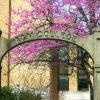 Education, Higher
Education, Higher Health and Medicine
Health and Medicine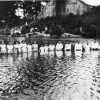 Religion
Religion World War II through the Faubus Era, 1941 through 1967
World War II through the Faubus Era, 1941 through 1967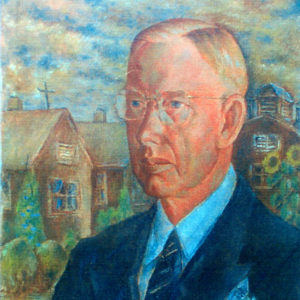 Joseph Hunter, portrait by Henry Sugimoto
Joseph Hunter, portrait by Henry Sugimoto 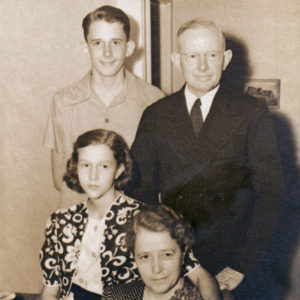 Joseph Hunter and Family
Joseph Hunter and Family 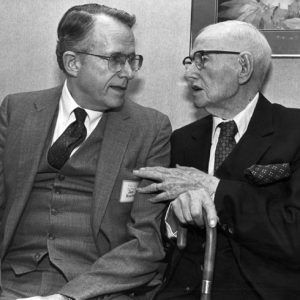 Joseph Hunter
Joseph Hunter 




Comments
No comments on this entry yet.